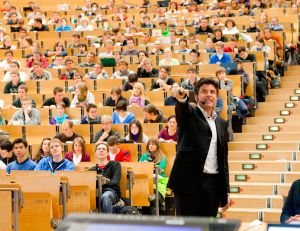A group of international experts has confirmed that Karlsruhe Institute of Technology (KIT) has an excellent in-house quality management system in the area of studies and teaching. For this reason, KIT has been granted the so-called system accreditation right today. Now, KIT is one of three TU9 universities which assess programs on their own and have the right to approve of their execution.
Normally, programs have to be accredited separately by external agencies to ensure a high quality of education. This is a time-consuming and cost-intensive process. Education institutions pos-sessing an adequate internal quality management system for stud-ies and teaching, however, have the right to assess and accredit programs on their own.
A group of international experts chaired by the President of ETH Zurich, Professor Lino Guzzella, together with the Swiss agency OAQ (Body for the Accreditation and Quality Assurance of Swiss Universities), reviewed the quality assurance system of KIT in a process taking several years. Based on the positive recommenda-tion by the experts, the OAQ today officially granted the right of so-called system accreditation to KIT. For a period of initially six years, KIT is given the right to assess its study programs and to provide them with an internationally acknowledged quality label upon a very detailed inspection.
“The experts found that the KIT is on a very good way in the educa-tion sector. Of course, this is considered a rather positive signal by the Supervisory Board. We congratulate the KIT on this success,” the Chairperson of the KIT Supervisory Board, Professor Renate Schubert, comments the evaluation results.
“We are very pleased about the vote of the experts, because it con-firms the high quality of education at KIT,” the President of KIT, Professor Holger Hanselka, says. “With this confirmation of an effective and adequate internal quality management system in studies and education, KIT has advanced a step further towards autonomy.”
The central element of internal quality assurance is the KIT-PLUS procedure. In analogy to external program accreditation, this proce-dure consists of several steps. By KIT-PLUS that started in the 2013 summer semester, the KIT departments are enabled to systemati-cally analyze and further develop the quality of their study programs. Analysis is based on structural data of the study programs and interviews of students and graduates.
“With KIT-PLUS, we have succeeded in installing a highly effective and reliable monitoring and control system,” says the Vice President for Higher Education and Academic Affairs of KIT, Professor Alex-ander Wanner, who managed the development and establishment of the internal quality assurance system. ”It is our objective to provide the young people with an excellent education and to prepare them optimally for their jobs in industry, science, and the society.”
“The students are pleased about the successful system accredita-tion of KIT. We expect that improvements of quality in education can be implemented more easily and more sustainably in the future,” says the Chairperson of the General Students Association AStA at KIT, Vera Schumacher.
About the Internal Quality Assurance System of KIT
Within the framework of KIT-PLUS, individual seminars, lectures, and courses are evaluated based on the Teaching Quality Index (LQI). In addition, study programs are assessed. For this purpose, each department drafts a report about every study program and makes proposals for the planned further development of the pro-gram. In addition to this multi-stage assessment procedure that takes place every three years, external experts are asked to submit two opinions every six years. These and the program report will be reviewed by a so-called KIT-PLUS Commission that prepares rec-ommendations for decision by the Presidential Committee. The KIT-PLUS Commission consists of five professors, three students, and a member of the academic staff. It is supported by the KIT Quality Management Group.

